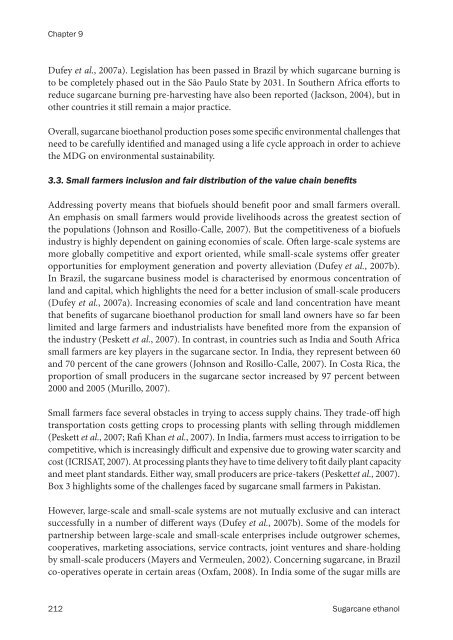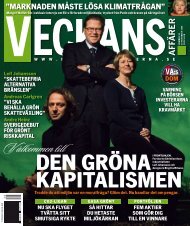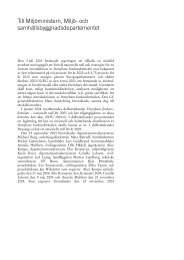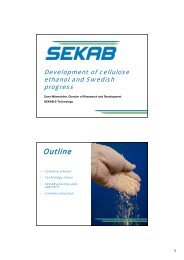Sugarcane ethanol: Contributions to climate change - BAFF
Sugarcane ethanol: Contributions to climate change - BAFF
Sugarcane ethanol: Contributions to climate change - BAFF
Create successful ePaper yourself
Turn your PDF publications into a flip-book with our unique Google optimized e-Paper software.
Chapter 9<br />
Dufey et al., 2007a). Legislation has been passed in Brazil by which sugarcane burning is<br />
<strong>to</strong> be completely phased out in the São Paulo State by 2031. In Southern Africa e�orts <strong>to</strong><br />
reduce sugarcane burning pre-harvesting have also been reported (Jackson, 2004), but in<br />
other countries it still remain a major practice.<br />
Overall, sugarcane bio<strong>ethanol</strong> production poses some speci�c environmental challenges that<br />
need <strong>to</strong> be carefully identi�ed and managed using a life cycle approach in order <strong>to</strong> achieve<br />
the MDG on environmental sustainability.<br />
3.3. Small farmers inclusion and fair distribution of the value chain benefits<br />
Addressing poverty means that biofuels should bene�t poor and small farmers overall.<br />
An emphasis on small farmers would provide livelihoods across the greatest section of<br />
the populations (Johnson and Rosillo-Calle, 2007). But the competitiveness of a biofuels<br />
industry is highly dependent on gaining economies of scale. O�en large-scale systems are<br />
more globally competitive and export oriented, while small-scale systems o�er greater<br />
opportunities for employment generation and poverty alleviation (Dufey et al., 2007b).<br />
In Brazil, the sugarcane business model is characterised by enormous concentration of<br />
land and capital, which highlights the need for a better inclusion of small-scale producers<br />
(Dufey et al., 2007a). Increasing economies of scale and land concentration have meant<br />
that bene�ts of sugarcane bio<strong>ethanol</strong> production for small land owners have so far been<br />
limited and large farmers and industrialists have bene�ted more from the expansion of<br />
the industry (Peskett et al., 2007). In contrast, in countries such as India and South Africa<br />
small farmers are key players in the sugarcane sec<strong>to</strong>r. In India, they represent between 60<br />
and 70 percent of the cane growers (Johnson and Rosillo-Calle, 2007). In Costa Rica, the<br />
proportion of small producers in the sugarcane sec<strong>to</strong>r increased by 97 percent between<br />
2000 and 2005 (Murillo, 2007).<br />
Small farmers face several obstacles in trying <strong>to</strong> access supply chains. �ey trade-o� high<br />
transportation costs getting crops <strong>to</strong> processing plants with selling through middlemen<br />
(Peskett et al., 2007; Ra� Khan et al., 2007). In India, farmers must access <strong>to</strong> irrigation <strong>to</strong> be<br />
competitive, which is increasingly di�cult and expensive due <strong>to</strong> growing water scarcity and<br />
cost (ICRISAT, 2007). At processing plants they have <strong>to</strong> time delivery <strong>to</strong> �t daily plant capacity<br />
and meet plant standards. Either way, small producers are price-takers (Peskett et al., 2007).<br />
Box 3 highlights some of the challenges faced by sugarcane small farmers in Pakistan.<br />
However, large-scale and small-scale systems are not mutually exclusive and can interact<br />
successfully in a number of di�erent ways (Dufey et al., 2007b). Some of the models for<br />
partnership between large-scale and small-scale enterprises include outgrower schemes,<br />
cooperatives, marketing associations, service contracts, joint ventures and share-holding<br />
by small-scale producers (Mayers and Vermeulen, 2002). Concerning sugarcane, in Brazil<br />
co-operatives operate in certain areas (Oxfam, 2008). In India some of the sugar mills are<br />
212 <strong>Sugarcane</strong> <strong>ethanol</strong>












